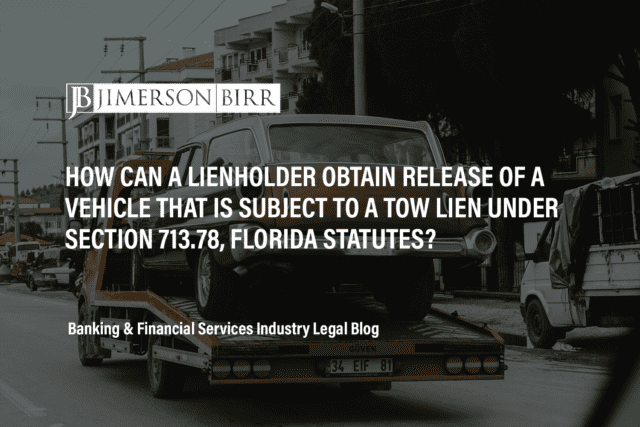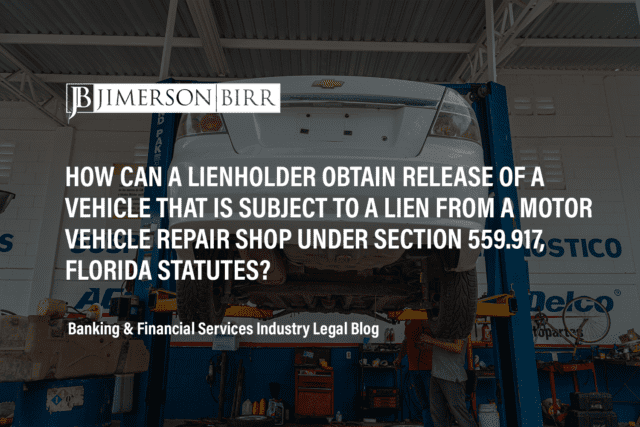Replevin, Repossession, and Attachment
What are replevin, repossession, and attachment?
Under Florida law, replevin, repossession, and attachment are actions to secure possession of property. However, subtle differences make specific actions more appropriate in particular situations.
Replevin actions involve disputes over ownership or possession of personal property, such as cars, boats, or artwork. The plaintiff must prove that they have a right to possession of the property and that the defendant wrongfully took or is wrongfully detaining the property.
Repossession occurs when a borrower has failed to make timely payments on a loan or debt. This process allows a creditor to take possession of property used to secure a loan or debt, typically a car, boat, or another valuable asset. If the borrower does not cure the default, the creditor may sell the property at a public auction to recoup the remaining loan balance.
Attachment involves seizing property owned by a debtor to secure a debt. An attachment action may be more appropriate than repossession in Florida when a creditor is concerned that a debtor may try to hide or dispose of their assets before the creditor can execute the judgment. For example, suppose a creditor has reason to believe that a debtor plans to sell their assets or transfer ownership to another person to avoid paying their debt. Then, the creditor may file an attachment action to seize and hold the property until the court issues a judgment.
Need help with replevin, repossession, or attachment action? Schedule your consultation today with a top accounts receivable and judgment collections attorney.
What legal issues typically arise related to replevin, repossession, and attachment?
Replevin, repossession, and attachment are three separate actions commonly pursuing a similar goal: regaining possession of property. Therefore, the types and forms of legal issues a plaintiff or defendant may encounter will vary depending on the action taken.
Legal disputes over ownership or possession of personal property often lead to replevin actions, including the following:
- Breach of contract: A party may file a replevin action if the other party breaches a contract and wrongfully takes or detains personal property that was the subject of the contract.
- Non-payment of debts: A creditor may file a replevin action if a debtor has failed to pay a debt and the creditor has a security interest in the personal property used to secure the debt.
- Stolen property: A person who believes that another person has stolen their personal property may file a replevin action to recover possession of the property.
- Disputes over ownership: A person who believes they have a right to possession of the personal property allegedly wrongfully held by another person may file a replevin action to recover possession of the property.
Legal disputes over a creditor’s right to repossess property used to secure a debt often lead to repossession actions, including the following:
- Default on loans: A creditor may initiate a repossession action when a borrower defaults on a loan and fails to make payments as required by the loan agreement.
- Breach of lease agreements: A creditor may initiate a repossession action when a lessee breaches a lease agreement and fails to make rental payments.
- Failure to pay for goods: A creditor may initiate a repossession action when a debtor fails to pay for goods purchased on credit.
Attachment actions relating to a creditor’s concern that the debtor may try to hide or dispose of assets lead to common legal issues, including the following:
- Breach of contract: A creditor may initiate an attachment action if a debtor has breached a contract and the creditor is concerned that the debtor will dispose of their assets before the court renders judgment.
- Non-payment of debts: A creditor may initiate an attachment action if a debtor has failed to pay a debt and the creditor believes the debtor will dispose of collectible assets before judgment.
- Fraudulent transfers: A creditor may initiate an attachment action if a debtor has transferred assets fraudulently, such as transferring property to another person to avoid paying a debt.
What are relevant laws related to replevin, repossession, and attachment in Florida?
Chapter 78 of the Florida Statutes guides the process for replevin actions, including the following:
- Section 78.055 sets forth the requirements for initiating a replevin action in Florida, including filing a complaint that describes the property and the plaintiff’s right to possession.
- Section 78.068 sets forth the procedures for obtaining a writ of replevin, including the requirement that the plaintiff provides a bond and the process for executing the writ.
Part VI of Chapter 679 guides, in part, the process for repossession actions, including the following:
- Section 679.609 identifies a secured party’s right to take possession after the debtor defaults.
- Section 679.610 sets forth the requirements for the disposition of collateral, which a creditor must follow when selling repossessed property.
Chapter 76 guides the process for attachment actions, including the following:
- Section 76.08 sets forth the requirements for initiating an attachment action in Florida and references the specific statutes that help creditors determine what type of attachment motion to follow.
- Section 76.12 sets forth the requirements for posting a bond in an attachment action, including the amount of the bond and the process for obtaining approval of the bond.
What is required to prove a case of replevin, repossession, and attachment in Florida?
Despite some commonalities, replevin, repossession, and attachment maintain separate requirements to prove a claim.
A plaintiff must establish the following elements to receive a writ of replevin against a debtor:
- Ownership or right to possession of the property in question;
- Debtor’s wrongful possession: There must be evidence that the defendant is wrongfully possessing or detaining the property. Commonly, plaintiffs premise wrongful possession based on the defendant taking the property without permission or refusing to return it after the plaintiff demanded its return;
- Demand for possession: The plaintiff must show that they demanded the return of the property from the defendant before filing the replevin action; and
- Posting of a bond: In Florida, courts generally require the plaintiff to post a bond equal to twice the value of the property in question to obtain a writ of replevin.
A plaintiff must establish the following elements to prove a case of repossession:
- A valid security interest in the property: Written agreements typically establish security interests.
- Debtor’s default under the terms of the contract;
- Notice: The creditor must provide the debtor with their intent to repossess the property and an opportunity to cure the default by paying the outstanding debt;
- Peaceful repossession: If the debtor fails to cure the default, the creditor may repossess the property if they can avoid breaching the peace. Repossession must occur without the use of force or threats of force. Creditors must be cautious with executing on-premises repossession to prevent breaches of the peace and should consult with an attorney before making such an attempt; and
- Notice of intent to dispose of property: Upon repossession, the creditor must provide the debtor with notice of their intent to dispose of the property and information on how the debtor can redeem the property.
A plaintiff must establish the following elements to prove a case of attachment:
- Valid claim: The creditor must have a valid claim against the debtor, such as an outstanding debt;
- The danger of disposal: The creditor must show that there is a danger that the debtor will dispose of their assets before the creditor can execute the judgment;
- Specific property: There must be a particular property (or properties) that can be attached, such as a bank account or real property; and
- Bond: The creditor must post a bond, which protects the debtor if they later discover that the attachment is wrongful.
When a set of facts is appropriate to meet the requirements of replevin, repossession, or attachment, there are many paths a claimant may take. We are value-based attorneys at Jimerson Birr, which means we look at each action with our clients from the point of view of costs and benefits while reducing liability. Then, based on our client’s objectives, we chart a path forward to seek the appropriate action to ensure your property’s protection.
To see what actions may be available for your unique situation, please contact our office to set up your initial consultation.
What are common defenses to replevin, repossession, and attachment in Florida?
The primary defenses to replevin actions include the following:
- Ownership or right to possession: The defendant can challenge the plaintiff’s ownership or right to possession of the property. For example, the defendant may claim that they are the rightful owner of the property or that they have a superior right to possession.
- Wrongful possession: This argument asserts that the debtor’s possession of the property is not wrongful, such as if they obtained the property through a valid contract or held it as collateral for a debt.
- Failure to demand: The plaintiff failed to demand the return of the property before filing the replevin action.
- Defective writ: The writ of replevin is insufficient, such as if it was improperly issued or if the plaintiff did not follow the procedures for executing the writ.
- Fraud: The plaintiff obtained the writ of replevin through fraud or misrepresentation. Debtors should ensure sufficient evidence to support this claim before asserting it as a defense to replevin.
The primary defenses to repossession actions include the following:
- No default: This argument rests on the premise that the debtor did not default on their obligations under the agreement by making all required payments on time.
- No notice: The debtor could contend they did not receive proper notice of the creditor’s intent to repossess the property or the opportunity to cure the default.
- Breach of peace: The debtor can assert that the creditor’s repossession breached the peace, such as if the creditor used force or threats of force.
- Improper sale: This challenges the sale of the repossessed property by claiming that the creditor did not conduct the sale commercially reasonably.
- Redemption: The debtor can seek to redeem the property by paying the outstanding debt and any associated fees and costs.
The primary defenses to attachment actions include the following:
- No valid claim: The debtor could posit that the creditor has no valid claim against them, such as by claiming prior payment of the entire debt or a lack of a contractual relationship between the parties.
- No danger of disposal: The debtor can challenge the creditor’s assertion that there is a danger that they will dispose of their assets before judgment.
- Exempt property: The debtor can claim that the attached property is exempt from attachment under Florida law, such as if it is a homestead property or necessary for the debtor’s livelihood.
- Improper notice: The debtor did not receive proper notice of the attachment action, especially if the notice did not conform with Florida law.
- Insufficient bond: The creditor’s bond is too low to protect the debtor’s interests adequately.
For all three of these actions, judgment creditors must be cautious to avoid causing any harm to the sought-after property. If not, the debtor will likely seek damages against the creditor.
To see what defenses may be available for your unique situation, please contact our office to set up your initial consultation.
Have more questions about a replevin, repossession, or attachment-related situation?
Crucially, this overview of replevin, repossession, and attachment does not begin to cover all the laws implicated by this issue or the factors that may compel the application of such laws. Every case is unique, and the laws can produce different outcomes depending on the individual circumstances.
Jimerson Birr attorneys guide our clients to help make informed decisions while ensuring their rights are respected and protected. Our lawyers are highly trained and experienced in the nuances of the law, so they can accurately interpret statutes and case law and holistically prepare individuals or companies for their legal endeavors. Through this intense personal investment and advocacy, our lawyers will help resolve the issue’s complicated legal problems efficiently and effectively.
Having a Jimerson Birr attorney on your side means securing a team of seasoned, multi-dimensional, cross-functional legal professionals. Whether it is a transaction, an operational issue, a regulatory challenge, or a contested legal predicament that may require court intervention, we remain a tireless advocate every step of the way. Being a value-added law firm means putting the client at the forefront of everything we do. We use our experience to help our clients navigate even the most complex problems and come out the other side triumphant.
If you want to understand your case, the merits of your claim or defense, potential monetary awards, or the amount of exposure you face, you should speak with a qualified Jimerson Birr lawyer. Our experienced team of attorneys is here to help. Call Jimerson Birr at (904) 389-0050 or use the contact form to set up a consultation.


We live by our 7 Superior Service Commitments
- Conferring Client-Defined Value
- Efficient and Cost-Effective
- Accessibility
- Delivering an Experience While Delivering Results
- Meaningful and Enduring Partnership
- Exceptional Communication Based Upon Listening
- Accountability to Goals











